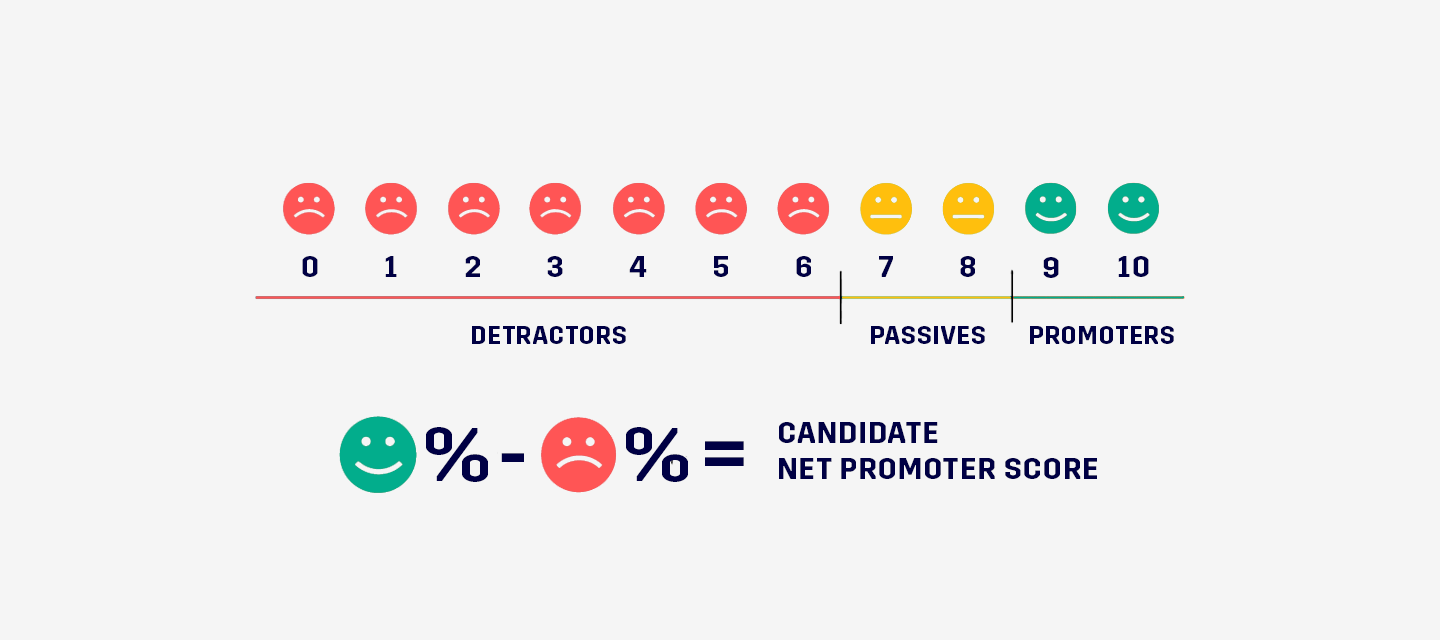
Olle Zander
Marketing Manager at Trustcruit
Candidate Net Promoter Score – All You Need to Know
The key metric that can change your recruitment to the better
— Denna sida är också tillgänglig på Svenska 
When talking to your candidates you probably wonder what they really think about you.
You might have heard some say that they are really satisfied 😊and others that are not happy at all 🙁. The problems your unhappy candidates had, could be fixed, and you can move on with business as usual.
But hey! Do you really get the true picture working this way?
Well, you will receive some feedback, but I am almost sure you are not getting the full picture of what people really think about you and if your candidate experience really is as good as your competitors.
What I want to say is that collecting feedback by just talking to someone will not do the trick. What you need to do, is to start to collect feedback in a systematic manner and become data-driven – to really understand if your candidate experience is great or not.
In fact, Virgin Media lost $5 million USD annually because of a bad candidate experience. 6% of all clients that dropped out were unhappy candidates.
And how did they find this out? By being data-driven of course!
This guide will give you an in-depth view of why and how you should collect feedback with the key metric Candidate Net Promoter Score and become data-driven.
Doing this will give you the real view of what your candidates really think about you and boost your employer brand.
Before getting started you might wonder, what is Candidate Net Promoter Score? Continue reading and I will tell you.
Contents:
- What is Candidate Net Promoter Score?
- The Origin of CNPS
- Why You Need Candidate Net Promoter Score
- When to Use CNPS
- How Organizations Use CNPS to Improve Recruitment
- How to Calculate Candidate Net Promoter Score
- Use CNPS to Benchmark to Your Industry
- Get Started to Measure Candidate Experience With Candidate Net Promoter Score
- Summary

What is Candidate Net Promoter Score?
Tricky words with long names can be scary. Luckily, our friend Candidate Net Promoter Score has an abbreviation, CNPS. It is getting more and more commonly used by serious organizations who really care that their candidates get a great impression of their employer brand and want to turn their candidates to promoters of their brand.
But what is CNPS really?
Candidate Net Promoter Score is a key metric that you and your organization can use to measure and improve your recruitment process and strengthen your employer brand. In other words, it lets you measure and improve your candidate experience.
It is used to measure specific steps of your recruitment process, all the way from the candidate’s application, interview, rejection and to the onboarding step.
This means that your Candidate Net Promoter Score will give an understanding of what parts of the candidate experience you need to improve and what parts you are successful within.
CNPS is measured using the question:
“How likely is it that you would recommend [Brand X] to a friend or colleague?
Candidates can answer on a scale ranging from 0-10. Where 0 gives a low score and the perfect 10 is the highest score. This means that the higher your Candidate Net Promoter Score equals, the better candidate experience and more ambassadors for your employer brand.
The results are presented in a numerical range starting at -100 and end at +100 and can be compared to your competitors’ Candidate Net Promoter Score to give you an understanding of how well you perform against others.
Further down in this guide you will learn more about how to measure your Candidate Net Promoter score, but more about this later.
But first, let us dig into the background of Candidate Net Promotor Score and its parent, Net Promoter Score.

The Origin of CNPS
As Candidate Net Promoter Score still is not known by everyone, you probably want to know more about its background.
Candidate Net Promoter Score is a rather new term based on the more commonly used Net Promoter Score. Usually written as NPS in its abbreviated form.
You probably already have heard of Net Promoter Score. It is a key metric that originates from an extensive 2003 Harvard study by American author Frederick F. Reichheld.
The Net Promoter Score is used to collect feedback and measure the loyalty of an organization. Reichheld’s study has totally changed how organizations think and act when collecting feedback from customers.
What is so radical with Reichheld’s findings can be described with this statement from his study:
“It turned out that a single survey question can, in fact, serve as a useful predictor of growth”
The statement is indeed very powerful but gets even more interesting in this quote:
“…the percentage of customers who were enthusiastic enough to refer a friend or colleague – perhaps the strongest sign of customer loyalty – correlated directly with differences in growth rates among competitors.”
Reichheld’s study including these quotes makes Net Promoter Score a relative measure for predicting your organization’s growth.
To fully understand the Net Promoter Score, you need to understand some of its fundamental principles. To explain them, here are a few examples.
- a plumber’s NPS cannot be compared to the NPS of a real estate agent
- a plumber’s NPS can be compared to other plumbers’ NPS
- if compared correctly, the organizations with the highest NPS also will have higher growth than their competitors.
As you can see, you can compare your Net Promoter Score with your competitors in the same industry, but not other industries.
That is why the Candidate Net Promoter Score was created – to be able to measure the candidate experience and loyalty in the recruitment process.
Now you are hopefully as excited as us and understand how wonderful this key metric is, but still do not know what impact it can make on your business.
Well, let us look into it then.

Why You Need Candidate Net Promoter Score
As mentioned at the beginning of this guide, you cannot collect feedback at random when a candidate says it directly to your face. It simply is not accurate enough and will leave you far behind your competition.
But why?
If you collect feedback at random. you will only receive feedback from some candidates – the very satisfied outgoing ones and the dissatisfied outgoing ones. The rest of your candidates will remain quiet and feedback will be collected inconsistently.
If your feedback is gathered anonymously, automatically and timely you will be able to receive feedback at all times, during specific steps in your recruitment process e.g. after an application has been sent to you or a job interview has been conducted.
Great, right?
Well, there is more to it. Your feedback will also become more honest as candidates get the chance to give it to you anonymously.
Now you know that you cannot collect feedback when someone tells it to you in person, but the question still remains…

Why is Candidate Net Promoter Score the solution?
So why should you measure your candidate experience with Candidate Net Promoter Score?
For starters, CNPS makes it possible for you to gather large amounts of feedback anonymously, automatically and timely.
It is also specially designed to measure the candidate experience. This means that your Candidate Net Promoter Score will give you an understanding of what your candidates think about your whole recruitment process and how your employer brand is perceived.
Insights about individual steps of your recruitment process can be very valuable as you will understand what steps to prioritize and focus on improvement. It will also enable you to make data-driven decisions that you for sure know are the right actions to take and increase the performance of your recruitment and employer brand.
The impact of having the ability to make decisions and actions on these insights from your Candidate Net Promoter Score will improve your candidate experience and turn your candidates into promoters.
More promoters of your employer brand will make more candidates apply and rejected candidates to apply again. This will also result in higher quality and relevancy of applying candidates, which means access to the best candidates in your industry.
In fact, 23% of all candidates say they do not want to apply to an organization again because of a bad candidate experience.

When to Use CNPS
Using Candidate Net Promoter Score in your Recruitment Process
As mentioned earlier, the Candidate Net Promoter Score can be used to measure candidate experience throughout different steps of your recruitment process.
The easiest and best way to ask your candidates the Candidate Net Promoter Score question is through anonymous feedback forms sent to your candidates after a step of your recruitment process has passed. This gives you the ability to understand what you did well and bad during each individual step.
Letting the candidate answer anonymously will give you the candidate’s true opinion, which in turn will give you more relevant feedback. If CNPS is gathered together with complementary questions e.g. “Did you lack any essential in the job description?” or “Were your interview scheduled in a reasonable time frame?”.
You will then be able to understand the reason for a low or high Candidate Net Promoter Score.
Measure Performance with CNPS Internally
Using Candidate Net Promoter Score within your organization can be a great measurement of the performance of your recruitment team or department.
Compare the scores within your own teams. Since you can compare and benchmark Candidate Net Promoter Score, comparing your scores will give an understanding of how each team performs and what each individual team needs to improve and know what they excel at.
Most valuable of all is maybe to follow up on the organization’s CNPS over time and discuss the results during internal meetings. Most organizations that measure Candidate Net Promoter Score follow up on their CNPS during weekly or monthly meetings. Talking about how to act and improve on the results. In this way, your team can really make your recruitment process modern and become better to turn your candidates into promoters.
But, what if you are about to hire a new recruiter for your team or department?
Well, then you can also use CNPS. Ask for the new recruiter’s personal Candidate Net Promoter Score. If you value a well-renowned employer brand and good candidate experience, you need to ask this as it gives you the true performance of this new recruiter.

How Organizations Use CNPS to Improve Recruitment
The aim of the key metric Candidate Net Promoter Score is as mentioned to create a good candidate experience. Keep in mind that you should look at your candidates as your customers. As in the previously mentioned Virgin Media case where their candidates actually are their customers.
There is high chance that your candidates also are your customers or will become your customers in the future. To give you an understanding of how you can work with both candidate and customer experience, here are some examples of four organizations who successfully measure Net Promoter Score and Candidate Net Promoter Score.

Apple
Many of us buy Apple products, but why do we do it? Because we are loyal and our friends and family talk about them of course!
Apple has always worked close to their customers and has a NPS of +72. The reasons for this impressive score are many, but the main reason is customer first.
The company have focused on relieving purchasing anxiety by clearly communicating customer benefits to make the consumer feel secure. Adding unique customer experiences, focus on employee satisfaction, simplifying for their customers and the promise to always innovate.
It sounds simple, but they would never have been able to make this journey without close customer contact and always putting their customers first.

Tesla
Tesla has managed to get an extremely high customer retention and a NPS of +96. Their customers are loyal and 91% of Tesla clients will buy a Tesla again.. This means that Tesla owners recommend and talk positively about the experiences they have in their Teslas.
But how did they manage to do this. Well, they have built a product that consumers want. Made them user-friendly and personalized their customer experience.
Except for measuring NPS, Tesla works closely with its customers and visit customers and offer hassle-free support that also communicate with other departments in the organization to make improvements and create an even better product.
Columbus
Columbus is at IT consulting company with over 2 000 employees globally. They have mastered the art to attract IT talent in an industry where candidates have very high expectations and demands on their employers. Being able to attract talented IT employees for an IT consulting company is very important as it gives them a competitive advantage.
Columbus managed this by collecting HR analytics data during their candidate experience to generate a Candidate Net Promoter Score (CNPS). Actions as educating their employees, testing new candidate touchpoints in their communication and an overall constant improvement have given them a CNPS of +64. Way beyond their competitors.

Netflix
Netflix Net Promoter Score of +68 might seem low compared to Tesla, but is still far above their competition. Their subscribers stay paying customers for 25 months in average, which means that Netflix has plenty of time and resources to acquire new ones.
The recipe for Netflix success is that they have developed over time. They have adapted themselves to how we consume movies and TV series from DVDs to our smartphones. Customers also have the ability to call or chat with their support and talk to a real person when they run into an issue, which is rare for their industry. And have made their customers happier.
Another reason for a high number of promoters is the simplicity of their service. Everyone knows and understand how Netflix works, it is just simple.
What Do These 4 Organizations Have in Common?
As you can learn from these four examples, you can simply not just measure CNPS or NPS to improve and create a good candidate or customer experience.
Here are the most important factors successful organizations work with :
- Constantly measure and collect feedback from their candidates/customers
- Communicate feedback throughout the organization
- Act, improve and adapt their product/service to their candidates/customers
- Make their product/service simple to use and understand
And this gives them very happy candidates, customers and plenty of promoters of their brands.

How to Calculate Candidate Net Promoter Score
To be able to fully understand how the Candidate Net Promoter Score really works you need to have an understanding of how the key metric is calculated.
As mentioned at the beginning of this article – the CNPS scale ranges from -100 to +100. This scale indicates how likely it is that your candidates will promote your employer brand. The higher your Candidate Net Promoter Score is the more loyal candidates and promoters.
As your results will be shown between -100 to + 100, your candidates will be able to answer the question:
How likely is it that you would recommend Brand X to a friend or colleague? on a scale of 0-10.
Candidates who answer between 0 and 6 are called Detractors. Your Detractors are very unlikely to recommend your brand/company to someone else, and you want very few of these as they will pull down your Candidate Net Promoters Score unfavorably for your Promoters.
Your Promoters answer a 9 or 10 on the CNPS scale and are very likely to talk about and recommend you. And the more Promoters you have, the more ambassadors for your employer brand to help you grow it even stronger among your candidates and other stakeholders.
Wait, we forgot something! There are two scores left, 7 and 8.
7 and 8 are the Passives, which are candidates who neither detract or promote your brand. These may often be forgotten as they do not affect your candidate loyalty or employer brand. But remember, the Passives are not far away from a 9 or 10 and to become your Promoters if you give them an even better candidate experience.
By adding up the scores in the 3 categories Detractors, Passives and Promoters and calculating the percentage of the total number of each category gives you the base to calculate your Candidate Net Promoter Score.
Now when you have the percentage of each category, subtract the percentage of Ambassadors with the percentage of Critics. Now you have your CNPS!

Example of a CNPS Calculation
This may sound a little tricky. To fully understand this, here is an example:
A company has 50 candidates who answer as following to the CNPS questions:
0: 12, 1: 1, 2: 3, 3: 1, 4: 2, 5: 1, 6: 2, 7: 5, 8: 5, 9: 8, 10: 10
This gives us:
Detractors: 22 (44%)
Passives: 10 (20%)
Promoters: 18 (36%)
36 (Promoters) – 44 (Detractors) = – 8
This means that our Candidate Net Promoter Score is -8 on the scale ranging from -100 to 100.
If you are not into math and have collected some data yourself, try our free CNPS Calculator.
For large quantities of feedback, we recommend using a tool that automatically collects data and calculates your Candidate Net Promoter Score.
Now when you finally have a CNPS, what does the number -8 mean, is it a good or bad result?
Well, the easiest way to do this is to benchmark your results against your industry.

Use CNPS to Benchmark to Your Industry
How to Compare Candidate Net Promoter Score
As mentioned earlier in this guide, it is possible to compare and benchmark the results of a Net Promoter Score.
This applies if you benchmark your score towards other scores in the same industry or sector, and also the individual step in your recruitment process e.g. after an interview or rejection.
As with the Net Promoter Score, you can also benchmark CNPS. All results from Candidate Net Promoter Score are within the field of recruitment. This means that you can benchmark your score against all other organizations that measure Candidate Net Promoter Score.
However, to benchmark your data to others, you also need their scores. As this data usually is not public, you need to use a service, which provides this type of data
Why Benchmark Your Candidate Net Promoter Score?
If your score is compared correctly against your competitors’, the organization with the highest CNPS will be the one with the best candidate experience and also the highest share of promoters of their employer brand.
This gives you an accurate exact answer to how well you perform.
As more and more organizations measure and increase their Candidate Net Promoter Score, which means that also their candidate experiences get better, the average CNPS is constantly evolving.
For you who have not started to measure CNPS yet, it is time to do it now!
If your competitors improve their candidate experiences, you will eventually be very far behind and lose the best candidates to others because you cannot perform as well as them.

Get Started to Measure Candidate Experience With Candidate Net Promoter Score
Getting started to measure your candidate experience and Candidate Net Promoter Score is not hard and can be done automatically if you already use an ATS.
Except for an ATS, you also need an HR Analytics tool…
Trustcruit helps you measure your candidate experience using feedback forms sent out during every stage of your recruitment process. Collected feedback can be analyzed, measure your performance and benchmark against other organizations.
Want to know more? Book a demo with us at Trustcruit to see how you can start measure CNPS and turn your candidates into promoters.
Summary
What Is CNPS?
CNPS or Candidate Net Promoter Score is a key metric to measure candidate loyalty and satisfaction during all steps of your recruitment process and the likeliness of turning candidates into promoters of your employer brand.
Why Measure CNPS?
CNPS gives insights on your performance during the different steps of your recruitment process to enable you to act and improve the candidate experience.
A high CNPS and positive candidate experience will boost your employer brand and increase the likeliness of your candidates to apply again and recommend you to others in their network.
Impact Of CNPS
More ambassadors will result in higher quality, relevancy and more applying candidates. This will give you access to and recruit the best candidates in your industry.
History of CNPS
Candidate Net Promoter Score originates from the Net Promoter Score, which is a key metric to measure growth, originating from an extensive 2003 Harvard study by American author Frederick F. Reichheld.
What is the CNPS Question?
The CNPS questions sent to candidates during the recruitment process is “How likely are you to recommend Brand X to a friend or colleague?”
How to Calculate CNPS
CNPS can be calculated using the formula %Promoters – %Detractors and will give you a score on the range -100 to +100.
How to Measure CNPS
Candidate Net Promoter Score is best measured using an HR analytics tool specialized in the recruitment process that gives you the ability to send feedback forms asking the CNPS questions automatically, and also let you analyze and benchmark your results.
Get notified on new blog updates
+ get our popular candidate experience ebook for free